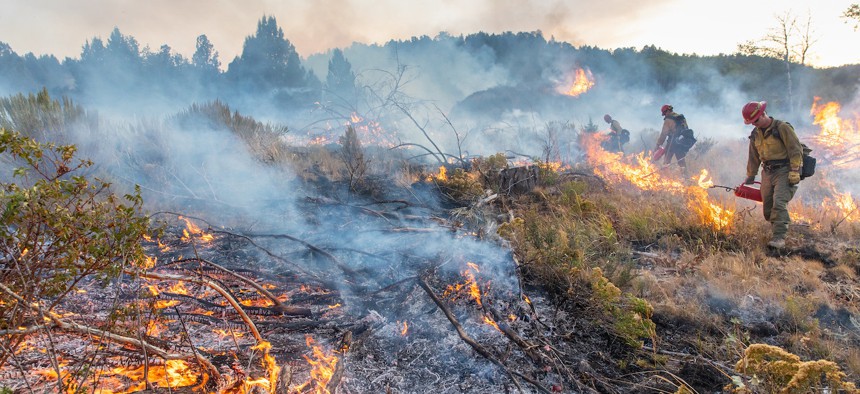
Firefighters using drip torches to light vegetation along a control line on the Bureau of Land Management's September 2019 Trout Springs Prescribed Fire in southwest Idaho. Neal Herbert/Interior Department
From Wildland Firefighters to Defense Language Instructors, Sometimes The Pay Is Way Too Low
Defense Language Institute employees are now in a pitched struggle to gain better pay.
Fire. It’s a perennial and powerful force that must be managed across America’s forests, prairies and other wildlands. But it’s also one that in recent years is growing in negative impacts—with the number of large-scale infernos doubling since the 1980s, imposing greater loss of life and financial costs as populations rise in affected areas and the climate change brings higher temperatures and longer and more severe dry spells.
Yet feds front and center in this increasingly tough line of work—wildland firefighters—for decades scraped by, at or near the bottom of the government’s pay structure. That’s the bad news. The good news is of late these long-underappreciated folks—by way of protest, petition and solidarity lobbying the Biden administration through their union—won at least a temporary major pay upgrade. A more permanent one is pending in Congress. So, for now, wildland firefighters whose pay often averaged under $15 per hour are seeing raises of at least $20,000 per year.
It’s a great story, with a good outcome (so far.) Good for our firefighters, even better for the country. But it won’t surprise this column’s readers that there remain many nooks and crannies across federal agencies where you still find indispensable, committed and hard-working public servants who, like wildland firefighters just a few years ago, remain badly undercompensated.
The Defense Language Institute is another such corner of the government. Wildland firefighters prevent and quench killer fires. DLI linguists train our military and feds across multiple agencies in contact with people from a variety of countries and cultures to avoid misunderstandings and, in many cases, violence and loss of life. The unit’s employees carry out this unsung but ever more essential work of teaching other feds—quickly and effectively, imparting language skills needed to accomplish missions across the globe.
But more than most smaller labor pools in our more than 2 million-strong government employee ocean, DLI’s key people—its teaching professionals—really get the short end of the stick. The DLI’s teaching professionals run courses of 36 to 64 weeks, instructing “active and reserve components, foreign military students, and civilian personnel working in the federal government and various law enforcement agencies.”
Like wildland firefighters, DLI’s employees are now in a pitched struggle to gain better pay—lobbying for a change in the law.
“The first thing you have to understand is that currently pay for DLI comes under a statute that is very vague—and it enables [management] to come up with whatever they want,” John Anderson, a lobbyist for the American Federation of Government Employees, recently told Government Executive. “They have complete latitude to do as they please. Starting with [the leverage that comes with] having annual renewable term appointments.”
“We don't have any real periodic review and pay step increase system,” Dennis Hickman, president of AFGE’s Local 1263 which represents the employees, added. “DLI explicitly has refused—and still refuses—to look at longevity or seniority. So, the only way to get pay increases after you get hired is through annual appraisal scores.”
Indeed, DLI’s staff come under its own excepted service Faculty Pay System , which has about 50 steps in pay from bottom to top, starting at about $47,000, but is exceptionally hard for most to progress along. Under 10 U.S.C. Sec. 1595, the secretary of Defense “may employ and prescribe compensation for civilian faculty members” with the agency. In practice, pay is low, union representatives say, compared with academic teaching positions outside government.
But perhaps the biggest snafu is that—as Hickman noted—since seniority is not considered at all with respect to pay, to move up in compensation you must step up in position, requiring three years in a row of coming in at the top of favorable reviews hugely in the hands of supervisors. Yet supervisors are themselves competing in the same pool for a very limited number of “rank advancements.”
“I’ve noticed a pattern,” Hickman said wryly. “That every—perhaps—three years, most people who were doing well suddenly don’t do excellently on that assessment.”
The union and the Defense Department unit’s professionals are pushing hard for a change. They want the Defense Business Board to get involved and support repealing the law that keeps approximately 1,700 language instructors under this arbitrary and for most poorly compensated pay system.
“The vast majority of the faculty’s frustrations stem from the excepted-service, limited-term appointments by which all faculty members are hired,” Hickman wrote in a letter to the DBB’s chairwoman, Deborah Lee James, last month.
“To expand the use of term or temporary appointments for skilled workers”—the current plan by DLI’s overseers—"is unmindful of the high costs of turnover and developing a workforce and is inherently contradictory to the idea of managing the talent of the workforce one has,” Hickman noted in that correspondence.
The next step in what promises to be a complex battle at DLI for less arbitrary and better pay, according to the union, is to hear back from the DBB—with the union hoping to get word “as soon as possible,” maybe by the end of this month.






